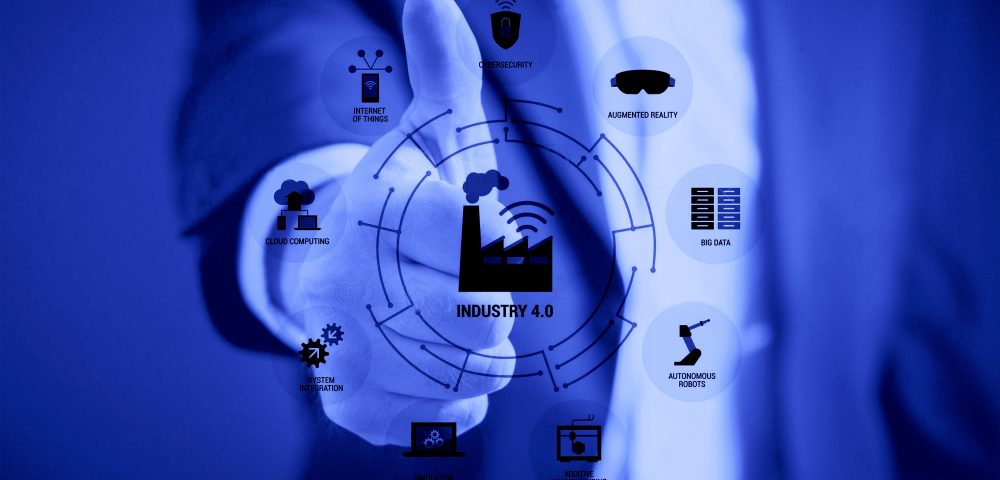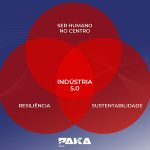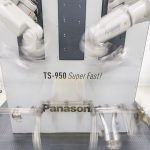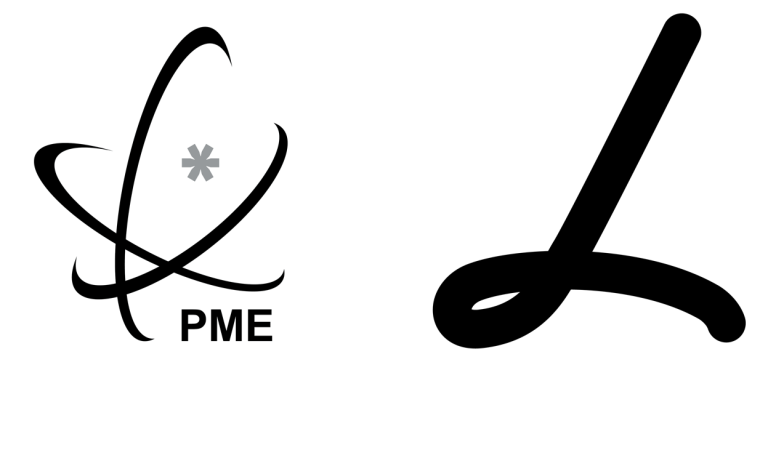Com a terceira Revolução Industrial, a automatização começou a estar presente nas fábricas, com máquinas cada vez mais avançadas e inteligentes. Se há uns anos atrás este conceito fazia parte do nosso imaginário, hoje em dia são peças fundamentais para o processo industrial das empresas.
Atualmente com um mercado cada vez mais competitivo, e um consumidor cada vez mais exigente, as empresas são praticamente desafiadas a adaptar o seu processo produtivo, com recurso a tecnologias mais avançadas, contribuindo para uma maior sustentabilidade e otimização.
Com isto surge uma nova revolução industrial, a chamada indústria 4.0, termo este que surge pela primeira vez na Alemanha, apresentado pelo governo alemão em 2011, impulsionada pelo aparecimento de tecnologias inovadoras que contribuíram para a evolução dos processos produtivos das indústrias, e que resultaram mudanças profundas quer nos sistemas de produção, quer nos negócios das empresas.
A automação industrial nas empresas, transformará a vida das pessoas trazendo mudanças sociais e económicas, e um impacto nos postos de trabalho num futuro próximo.
Futuramente, o processo produtivo de grande parte das empresas será controlado por sistemas robotizados, que serão capazes de cooperar, comunicar, monitorizar como se fossem humanos.
Uma das questões que se coloca sobre este assunto, é se o homem vai perder o seu emprego, sendo a mão-de-obra substituída por equipamentos robotizados. Este é um tema que gera muitas opiniões diferentes, mas sem qualquer dúvida podemos afirmar, que a substituição da mão humana pelos processos automatizados, poderão dar lugar a novos postos de trabalho.
Um estudo feito pelo CIP (Confederação Empresarial de Portugal), em parceria com o McKinsey Global Institute e a Nova School of Business and Economics, sobre o futuro de trabalho em Portugal, afirma que a automação nas empresas poderá contribuir para a perda de 1,1 milhões de posto de trabalho, mas por outro poderá criar entre 600 mil a 1,1 milhões novos postos de trabalho.
Os especialistas na área defendem que, sem dúvida haverá uma mudança na forma como iremos trabalhar. Tal como em todas as revoluções industriais que existiram ao longo da história, houve postos de trabalho que foram substituídos por outros.
Por que a automação nas indústrias é importante?
A automação é essencial para a evolução dos processos industriais, trazendo inúmeras vantagens para o sistema produtivo, como por exemplo:
. maior controlo e aperfeiçoamento dos processos,
. flexibilidade na produção,
. melhora as condições de segurança humana,
. reduz o esforço e a intervenção do trabalho humano,
. reduz os custos com o menor consumo de energia e/ou matérias primas,
. responde a necessidades particulares de cada empresa,
. aumento de competitividade face ao mercado cada vez mais exigente.
As chamadas fábricas inteligentes, recorrerão a um conjunto de tecnologias como a Inteligência Artificial (IA), Robótica, Big Data (IOT), Proteção de Dados, que permitem operar de forma automática, sendo capazes de processar tarefas pequenas e/ou repetitivas, prevendo e evitando falhas técnicas que possam pôr em causa o processo produtivo.
Do ponto de vista de emprego, serão necessários novos cargos técnicos com novas competências interdisciplinares. A presença destes profissionais, servirá para acompanhar todo o processo, fazendo a gestão programada dos equipamentos robotizados,e aqui a formação será de extrema importância.
Qualquer inovação no que respeita ao processo produtivo de uma empresa, requer algumas transformações, mas que de certa maneira vai trazer imensas vantagens que já foram descritas atrás.
A presença de robots é já uma realidade presente na indústria, e veio mudar a forma como lidamos com o processo produtivo. Um dos maiores desafios que muitas das empresas poderão deparar-se, é a abertura destas à implementação das novas tecnologias para o seu negócio, e na aposta na qualificação dos recursos humanos.
Certo é que a presença de robots no contexto industrial, aumentará a capacidade produtiva, possibilitando a concepção de produtos com mais qualidade, com um menor custo e com uma capacidade de resposta mais rápida.
No que respeita a recursos humanos, poderão gerar empregos mais qualificados, com mais segurança e menos desgastantes fisicamente.
Sob ponto de vista económico, a indústria 4.0 trará novas oportunidades para as empresas, promovendo o aparecimento de novos modelos de negócio. Através da integração e melhoria das novas tecnologias, poderá contribuir para o posicionamento no mercado e um maior crescimento das empresas.
Bibliografia:
https://www.dinheirovivo.pt/opiniao/a-automacao-e-o-futuro-do-trabalho-em-portugal/














